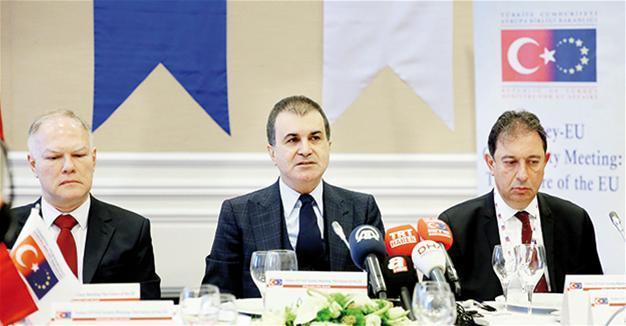Turkey says ‘no’ to second class EU membership
Serkan Demirtaş - BRUSSELS

AA photo
It’s everybody’s opinion that the relationship between Turkey and the EU is at a crossroads, especially after the European Parliament last week voted in favor of temporarily freezing accession negotiations. It is true that leaders from both sides do not hesitate to issue harsh criticisms against each other almost every day, at the expense of further damaging ties. Things are certainly not looking very promising on Ankara-Brussels ties.However, there are a number of new initiatives for avoiding what Turkish EU Affairs Minister Ömer Çelik calls the “communication problem,” as Turkey-EU relations go through severe turbulence. The Turkish EU Ministry launched a new civil society initiative in Brussels on Nov. 29 with the participation of Turkish and European journalists, academics and businessmen. Çelik actively participated in separate meetings and openly responded to questions from our European colleagues.
“Official dialogue with our EU partners continues, but we observe a decrease in the dialogue between journalists, academics and businessmen. There is a serious problem of communication. We need to overcome this. We should talk to each other, not about each other,” he said at the outset of the meeting.
The meetings will continue in Berlin, Paris and London in the coming weeks. In Brussels, the meeting between Çelik and journalists turned into a venue where the state of the relationship was candidly put on the table. Journalists found the opportunity to raise questions over undemocratic measures implemented in the aftermath of the failed July 15 coup attempt, particularly the arrest of journalists and academics. Çelik responded to all questions without hesitation.
“The whole of Europe showed remarkable solidarity with France after the Charlie Hebdo attack. We were also there. But we did not receive anybody from the EU in the first two months after the coup attempt, in which the Turkish Parliament was bombed. As a country whose parliament was bombed by coup plotters, we were expecting solidarity. If this solidarity had been shown, the EU would have given two main messages: First, it would have turned into an organization defending democracy out of its borders; second, it would also have given a message to the Islamic world that it defends democracy in a Muslim country aspiring to join the EU,” he said.
‘Don’t be unfair to real journalists’
Many of questions were about the arrest of journalists and whether they would receive a fair trial. “Personally I couldn’t live in any country where the rule of law does not exist. Our entire youth and university years passed fighting for this. That’s why I am involved in politics,” Çelik responded, while urging his interlocutors to look into the issue on a “case-by-case” basis.
“I will give you the example of Prof. Osman Özsoy. He appeared on a TV program just before the coup attempt, saying ‘I would be a colonel to better serve my country.’ When asked why he said that, he replied ‘You’ll see in the coming days,’ in clear reference to the coup attempt. Please do not call this man an academic, don’t be unfair to real academics,” he said. Another example he gave was Ekrem Dumanlı, the former editor-in-chief of the pro-Gülen daily Zaman, who once said he only printed his newspaper after getting consent from Fethullah Gülen, who lives in self-exile in the U.S.
“Please see all these things. Don’t do real journalists an injustice,” Çelik said.
‘Quality trial’ needed for coup plotters
Another question raised at the meeting was whether coup plotters would receive a fair trial, in light of so many Gülenists seeking asylum from European countries and fear that they would not get quality justice in Turkey.
“We will prosecute these plotters in a fair way. We should provide quality justice in order to better fight those plotters and defend our democracy. Otherwise we would not be doing our job properly,” Çelik replied, claiming that there was no sign so far that any unfair trial had been delivered.
No ‘second class’ EU membership
Another question referred to the recently discussed scenario of the EU providing Turkey a partnership short of full membership, along with other non-EU countries, especially after the Brexit vote.
“Turkey wants to be a full member. Turkey’s full membership is good for both Turkey and the EU. The question is: Which Turkey does Europe want? We want a democratic Turkey, with full respect for human rights, joining the EU. But the same question is in the minds of our public as well: Which Europe we are talking about?” Çelik said.
He responded to his own question: “The Europe on [former French President Nicolas] Sarkozy’s mind? God forbid! The Europe that [the U.K. Independence Party] UKIP or Austria has in mind? No. We simply do not want to be part of a Europe where Islamophobia, xenophobia and racism are on the rise,” he said.
Çelik thus underlined once again that Ankara’s ultimate objective is to join the EU as a full member and will not accept a “second class membership” or “privileged partnership.”











